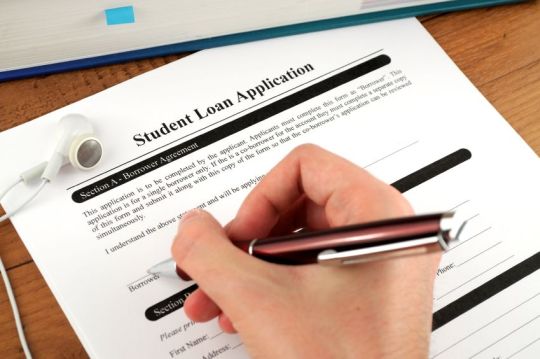

What Happens When You Stop Paying Your Student Loans

Student loans are, for many people, one of the first wake-up calls in Real Adult Life. While we may be used to paying cell phone bills, credit card bills, and even monthly rent, adding another hundreds-of-dollars payment to a monthly budget can feel like a massive smack to the face. And with little to no experience with these sorts of lenders and creditors, there’s temptation to just not pay them.
The day I found out my first “real” job came with an annual salary of $30,000, I thought I hit the jackpot. Until reality hit… this made my twice-monthly paychecks just under $1,000. And once the post-graduation grace period ended, payments toward my federal and private loans totaled $800 monthly — more than my share of a Brooklyn two-bedroom apartment. Faced with the daunting task of extreme budgeting, I did what any completely irresponsible 22-year-old would do: I stopped paying them completely.
I blame myself for not understanding the repercussions of my actions. I was a financial disaster, completely unprepared for this aspect of grown-up life. But it didn’t matter. At 22 with a 30k job in New York, my chances of needing to finance anything (a house, a car, a bicycle) were nil. I had one credit card from my credit union, and you’d have to really anger them for them to take a $500 limit credit card away. And I had about four separate store credit cards — including my favorite, J.Crew — so I was set. Or so I thought.
By virtue of reading this blog, you’re already more debt-savvy than 22-year-old me, so you probably know how this story ends. In my case, I was lucky — I was able to salvage my loans at the last second before defaulting. It’s nearly 10 years later, and I still thank my lucky stars for that timing. Not making loan payments will cause serious issues, but defaulting is far, far worse.
In case you’re curious, here are the day-to-day and serious repercussions of simply not paying. I report these from experience, but in debt collection, there are no stringent timelines and certainly no friends. If you’re playing the same game, proceed with caution. (You really, really don’t want to play this game.)
After a few weeks
About two weeks past your payment due date, your phone will start ringing about once per day, or every other day. At this point in the process it is usually not a human calling but rather an automated message reminding you your payment is due. I still sometimes get these calls when I forget to make payments, and refer to them as “friendly reminders from the nice student loan people.” Thanks to cell phones, screening calls is easy, but if you have a cosigner on your loans, they’ll end up calling them, too. (Sorry, mom!) Generally, you don’t have to worry about damage to your credit at this stage, though you may fall out of favor with lenders and be ineligible for interest reduction opportunities or other perks given to those who pay their bills on time.
After two months
Calls from the lender will probably increase in frequency. They also may come from an actual person, not the friendly computer voice. And urgent voicemails from these people are rarely friendly. Mostly, they are gruff and terrifying. After about 60 days of non-payment, your credit rating will likely take a hit. The loan company may report you as 30- or 60-days delinquent (it’s up to them), but they both have the same seriously debilitating effect. This is a major derogatory mark on your credit and it will stay there and haunt you for up to seven years.
After three months
Three months of non-payment will almost certainly be reflected on your credit report as 90 days past-due. Call frequency may slow down or even stop altogether — but this is not because the loan servicers have forgotten about you. It’s likely because they’ve given up on reaching you. At this point, they are virtually completely unresponsive to individual or extenuating circumstances — you aren’t holding up your end of the bargain, therefore your sob story is probably bogus.
It takes about nine months of nonpayment for federal loans to go into default; private loans, as always, carry different terms depending on your lender and the loan you received. Also, by now you’re playing with fire. If you default on loans, the entire amount is due immediately, you are ineligible for deferment or other aid programs, your loans will likely carry massive collection fees, and you can be sued and your wages garnished to complete payment.
What this will cost you
You don’t want bad credit, period. Even if you know that big ticket items (house, car) are in the far future, you’d be surprised how much can happen in seven years’ time. And while the effect of your delinquency on your credit will lessen over time, until it falls off completely, it’s likely lenders, landlords, and even future employers won’t trust you. At the very least, you will have to make extra effort to receive the same “normal” treatment as your creditworthy peers.
For me, this involved writing letters to potential landlords taking responsibility for my actions, and offering proof that I changed my ways. It meant never missing a payment on anything — loans and credit cards — but also never being one day late on my rent, ever. It also meant higher interest rates on credit cards and even higher security deposits for apartments. Plus, it feels crappy. No fun.




Many people don’t have just one loan with a servicer, they have several due to the way student finance is structured. And while you may be writing one single check each month to your servicer, that check is being distributed across each outstanding loan. Which means that, if you are late on your payments, and your servicer reports your late payment to credit agencies, it’s not just one ding on your credit report, it’s several, one for each separate loan.